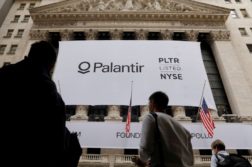Founded in 1857, BBVA is one of Spain’s leading banks and a major global financial services group. BBVA is also the biggest financial institution in Mexico and has a strong presence in South America and the Sunbelt region of the U.S.
“Blockchain [technology]can offer clear advantages for all sides in the corporate loan market in terms of efficiency, transparency, security,” said BBVA CEO Carlos Torres Vila, according to the Financial Times report. “It’s another strong example of how disruptive technology can be used to add value to financial services, something that is central to our strategy.”
Financial Times noted that DLT can speed up and simplify complex transactions by making changes and updates immediately visible to all parties. These benefits are especially significant for corporate and syndicated lending, which typically involve many participating actors that need access to transaction records. Another important consideration is that a single DLT system is cheaper to maintain than multiple systems used by different banks.
According to a BBVA press release , this is the “first global corporate loan transaction using blockchain technology from the negotiation of the deal to its signing.” The pilot project, completed in collaboration with Spanish technology company Indra, enabled the closing of a €75 million loan using a DLT solution developed by BBVA.
Indra is an information technology (IT) leader in Spain and Latin America and a worldwide provider of proprietary solutions for the transportation and defense markets. Both BBVA and Indra participate in global projects to create DLT standards such as R3, Hyperledger, the Enterprise Ethereum Alliance and Spain’s Alastria.
“BBVA is involving its clients in project processes such as requirements definition, development, and implementation,” said Ricardo Laiseca, BBVA’s head of global finance for corporate and investment banking, according to the press release. “In this way, BBVA provides its customers with not only the best financial solutions, but also the most advanced technical and innovative capabilities.”
Derek White, BBVA’s global head of customer solutions, added that DLT has proven to increase the transparency and speed of transactions, while also improving their efficiency.
The negotiation process and completion of conditions between BBVA and Indra was developed on an internal solution built on the Hyperledger codebase. It’s worth noting that Carlos Kuchkovsky, CTO of new digital business at BBVA, was recently confirmed as a member of the Hyperledger Governing Board. In his statement about the confirmation, Kuchkovsky noted that BBVA is using Hyperledger technology in several projects and stated that the bank wants to increase its contribution to Hyperledger by collaborating with other members and contributing to its open-source projects.
Once the contract between BBVA and Indra was agreed upon, the Ethereum public testnet was used to register the hash of the transaction’s documentation. A joint press release emphasized that registration on a public blockchain guarantees the integrity of the agreed contract, as any amendment in the agreed document would lead to a completely different hash.
Indra has also developed DLT products and solutions across a number of industries, including in the financial, insurance and retail sectors.
“Indra is at the vanguard when it comes to creating applications based on blockchain [technology], which is destined to become one of the technologies that will change the way we interact with products and financial services,” said Borja Ochoa, director of financial services at Indra, per the press release. “This pilot served as an opportunity to take part in the first corporate loan operation based on blockchain technology in the world. The operation strengthens the position of BBVA and Indra as leaders in the practical application of blockchain technologies.”
Read more at: Nasdaq







